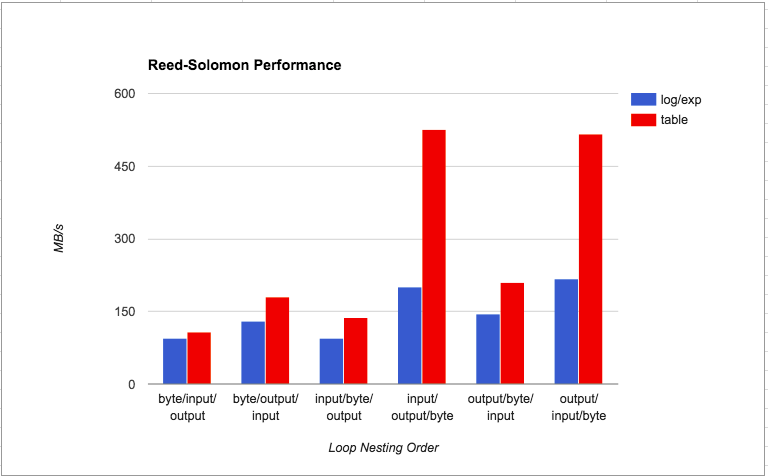This is a simple and efficient Reed-Solomon implementation in Java, which was originally built at Backblaze. There is an overview of how the algorithm works in my blog post.
The ReedSolomon class does the encoding and decoding, and is supported by Matrix, which does matrix arithmetic, and Galois, which is a finite field over 8-bit values.
For examples of how to use ReedSolomon, take a look at SampleEncoder and SampleDecoder. They show, in a very simple way, how to break a file into shards and encode parity, and then how to take a subset of the shards and reconstruct the original file.
There is a Gradle build file to make a jar and run the tests. Running
it is simple. Just type: gradle build
We would like to send out a special thanks to James Plank at the University of Tennessee at Knoxville for his useful papers on erasure coding. If you'd like an intro into how it all works, take a look at this introductory paper.
This project is limited to a pure Java implementation. If you need more speed, and can handle some assembly-language programming, you may be interested in using the Intel SIMD instructions to speed up the Galois field multiplication. You can read more about that in the paper on Screaming Fast Galois Field Arithmetic.
The performance of the inner loop depends on the specific processor you're running on. There are twelve different permutations of the loop in this library, and the ReedSolomonBenchmark class will tell you which one is faster for your particular application. The number of parity and data shards in the benchmark, as well as the buffer sizes, match the usage at Backblaze. You can set the parameters of the benchmark to match your specific use before choosing a loop implementation.
These are the speeds I got running the benchmark on a Backblaze storage pod:
ByteInputOutputExpCodingLoop 95.2 MB/s
ByteInputOutputTableCodingLoop 107.0 MB/s
ByteOutputInputExpCodingLoop 130.3 MB/s
ByteOutputInputTableCodingLoop 181.4 MB/s
InputByteOutputExpCodingLoop 94.4 MB/s
InputByteOutputTableCodingLoop 138.3 MB/s
InputOutputByteExpCodingLoop 200.4 MB/s
InputOutputByteTableCodingLoop 525.7 MB/s
OutputByteInputExpCodingLoop 143.7 MB/s
OutputByteInputTableCodingLoop 209.5 MB/s
OutputInputByteExpCodingLoop 217.6 MB/s
OutputInputByteTableCodingLoop 515.7 MB/s
